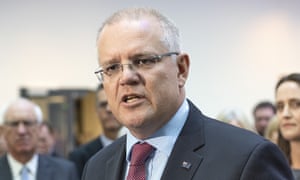Government announces generation projects that could win public
support, and will examine need for a new coal plant in Queensland
Scott Morrison has attempted to mollify rebel Queenslanders
by promising to examine whether a new coal plant is needed in north
Queensland, and by signing off on a shortlist for new power generation
that includes “one very small” coal project in New South Wales proposed
by coal baron and LNP donor, Trevor St Baker.
Cabinet on Tuesday signed off on a shortlist of 12 generation projects that could attract taxpayer underwriting, and allocated $10m for a feasibility study that will examine whether it is desirable to revive the decommissioned coal plant at Collinsville, south of Townsville.
The energy minister, Angus Taylor, said the detailed evaluation and feasibility assessment of projects in north and central Queensland would “include but are not limited to a new high-efficiency, low-emissions coal project in Collinsville, upgrades of existing generators, as well as gas and hydro projects”.
Tuesday’s development was initially endorsed by the former Nationals leader Barnaby Joyce, even though the government has not yet made a public binding commitment to any coal project.Cabinet on Tuesday signed off on a shortlist of 12 generation projects that could attract taxpayer underwriting, and allocated $10m for a feasibility study that will examine whether it is desirable to revive the decommissioned coal plant at Collinsville, south of Townsville.
The energy minister, Angus Taylor, said the detailed evaluation and feasibility assessment of projects in north and central Queensland would “include but are not limited to a new high-efficiency, low-emissions coal project in Collinsville, upgrades of existing generators, as well as gas and hydro projects”.
Joyce later tempered his initial enthusiasm. He told journalists the feasibility study was welcome “but we have to take the next step, and the next step as quickly as possible”.
Morrison told reporters the generation projects on the short list would now “be examined in closer detail before any final decision is made on any underwriting on the price position for those projects”.
Of the new analysis in Queensland, the prime minister said the government would look at a range of projects, including coal. But he said he was not providing a “commitment to underwrite or support any of those projects. We want to do the proper analysis to work out which project or which group of projects actually delivers on the need”.
The projects on the government’s initial shortlist include five gas projects, six pumped hydro and St Baker’s proposal for a coal upgrade at Vales Point at Lake Macquarie. St Baker is also the proponent of a pumped hydro project in South Australia which is on the list.
As well as appearing on the shortlist for underwriting, the Vales Point power station in NSW was registered under the Morrison government’s emissions reduction fund in August for a proposal to improve some of its turbines. That registration is the first stage in it being allowed to bid against land owners and other businesses for climate funding.
The government said the shortlist represented a combined capacity of 3,818MW of new generation, and the new projects would reduce the overall emissions intensity of the electricity grid.
The government says it will be targeting a 25% to 30% reduction in wholesale prices in each national electricity market region by 2021 as a consequence of helping new players into the market.
Tuesday’s hedged outcome reflects the government’s fraught internal politics on energy. Morrison has been caught between Queensland Nationals, who have been campaigning for the government to signal a taxpayer commitment to new coal generation, and metropolitan Liberals, who believe supporting coal could cost them their seats at the looming federal election.
The Australian Conservation Foundation blasted the Coalition’s move. “It’s very concerning that Scott Morrison has left the door open to using public money to fund new coal-fired power stations or upgrade existing stations to keep them operating longer,” said the ACF’s climate change program manager, Gavan McFadzean.
“In 2019, a responsible government does not even flirt with financial support for coal-fired power. The prime minister’s approach flies in the face of the climate science, which confirms that burning coal is the biggest contributor to climate change and is fuelling extreme weather events”.
Richie Merzian, the climate and energy program director at the Australia Institute, said the government’s underwriting program had “no budget, no criteria, no transparency, and according to legal advice commissioned by the Australia Institute, no legal mandate to proceed without legislation”.
The legal opinion commissioned by the progressive think tank said the Morrison government would not have the ability to roll out taxpayer support for underwriting unless it enacted supporting legislation or amended existing legislation.
“Without a legal mandate, the underwriting new generation program has been reduced to a campaigning tool to cherry-pick and promote proposals to continue Australia’s reliance on fossil fuels,” Merzian said.
Labor has said it would honour any valid contract the government entered into under the underwriting program. In February the shadow treasurer, Chris Bowen, said he believed the government would need to pass legislation underpinning any contract in order to make the arrangement lawful.
In the event no supportive legislation is passed, it is unclear whether the contract will be lawful.


No comments:
Post a Comment